Let’s say, hypothetically, that you’re a convicted criminal whose basic mental stability is in doubt and whose previous term as president ended in a failed coup attempt. How would you choose to spend the first day of your second term, apart from thanking the gods that you live in a country foolish enough to restore someone like you to power?
What you might do is seize the opportunity to reassure the wary center of American politics that they were right to gamble on you again.
Give a magnanimous and conciliatory inaugural address. Sign executive orders aimed squarely at the issues that won you the election, like taming inflation and deporting illegal immigrants with criminal records. Backburner the scorched-earth culture war for a few weeks or months. Members of your base will complain, but no worries—they’re not going anywhere.
That wasn’t how Day 1 of the Trump restoration went, as you might have expected if you spent even five minutes over the past decade observing Donald Trump.
Unpopularism.
His inaugural address wasn’t magnanimous or conciliatory and the executive actions he took on Monday night were emphatically not limited to consensus concerns like the rising cost of living. Curiously, he went out of his way to endorse policies that Americans either dislike or stand a very good chance of disliking once they digest them.
One order he signed purports to end 14th Amendment birthright citizenship in the United States for children of illegal—and even certain legal—immigrants. One recent survey placed public support for that at 41 percent for to 55 percent against. Another had it at 31-64. Polling on the matter has been consistent for years. If you’re a “deport the criminals first” Trump voter, you didn’t make it 24 hours before his immigration priorities shifted to fiddling with the Constitution.
Another new order suspended refugee resettlement in the United States. Polling on that is scant at the moment, but one 2023 survey found strong support in principle for admitting refugees across the political spectrum. Before Inauguration Day was over, news reports were trickling in about Afghans who’d been cleared to enter the U.S. abruptly having their flights canceled due to the new policy. Some are children hoping to join their families in America; others are related to active-duty service members; a few have legitimate reason to worry they’ll be persecuted by the Taliban, possibly for having assisted U.S. forces during our occupation of the country.
Pulling the rug out from under those people isn’t going to poll fantastically either, I expect.
The splashiest order Trump signed, of course, was the one that granted sweeping clemency to January 6 convicts and defendants. Republicans from J.D. Vance to attorney general nominee Pam Bondi to members of Congress had said recently that mercy for the J6ers should be decided on a case-by-case basis, not in a blanket manner, and universally agreed that violent offenders “obviously … shouldn’t be pardoned,” in Vance’s words. Even the biggest toadies in the GOP couldn’t fathom that Trump would do otherwise.
In the end, violent offenders were pardoned. Lots of them. “More than 600 rioters were charged with assaulting, resisting or impeding law enforcement officers at the Capitol,” the New York Times reported, “nearly 175 of whom were accused of doing so with deadly or dangerous weapons.” Every last insurrectionist pursued by the Justice Department received a full reprieve save for 14 ringleaders, some of whom were doing hard time for seditious conspiracy. Their sentences were commuted to time served.
Two recent polls found opposition to pardoning the J6ers at 57 and 59 percent, respectively, and that was before Americans understood that even the cop-beaters in the crowd that day would be let off scot-free.
Finally, Trump declared that the deadline for TikTok’s parent company to sell the platform to a U.S. interest should be extended by 75 days. There’s nothing whatsoever in the ban Congress passed that authorizes him to do that; he’s simply decided to exercise his prerogative as Caesar not to enforce the statute for that period. Within eight hours or so of swearing an oath to take care that the laws be faithfully executed, in other words, he’d already violated it.
Later, when reporters pressed him about the wisdom of allowing China to freely harvest Americans’ data, Trump noted that TikTok’s users skew young and wondered what, really, could be the harm in Beijing having information about a cohort like that.
The public might end up on his side of this issue, God help us, but between his brazen lawlessness in ignoring the ban and his callousness about national security, TikTok is another controversy that could backfire on him—especially if it leads pro-Trump hawks to doubt his alleged mettle toward China.
Why would he take so many dubious or unpopular stances on his first day back?
You can toss his casual babbling about tariffs into the mix too if you like. He told the media in the Oval Office yesterday evening that he’s considering 25 percent taxes on imports from Canada and Mexico next month, a proposition that 51 percent of voters in Quinnipiac’s latest national survey opposed, and one that that has room to turn much more sour for him if and when the tariffs take effect and prices rise.
What is the strategy, exactly, behind antagonizing so many Americans right out of the gate?
Strategic benefits.
Trying to find strategy in Trump’s behavior is often a fool’s errand. What was his “strategy” in hoarding classified documents at Mar-a-Lago, a crime that likely would have landed him in prison had he lost the election? What’s his “strategy” in grabbing Denmark by the lapels and demanding that it cough up Greenland even as it offers the U.S. a bigger presence on the island?
There’s no strategy. He wants things because he wants them and will try to take them if he thinks no one will stop him. He wants to end birthright citizenship and bar refugees from the United States and free violent goons who worship him and save the Chinese spy app he enjoys using. Who’s going to stop him from trying to do so?
Certainly not the Republican-controlled Congress. Not the voters either. He’s term-limited, after all, and he’s probably talked himself into sincerely believing his own propaganda about how November was an historic popular mandate to do anything he likes, the same way he talked himself into believing after the 2020 election that the vote really had been rigged. He doesn’t care what the fake-news polls say about his Day 1 orders. He knows in his heart that The People are with him.
But even if Trump didn’t have strategic motives in pressing his luck with unpopular policies on his first day, there are some strategic benefits to what he did.
It set the tone for his term, for one thing. Authoritarians don’t care about conciliation and consensus; the whole point of authoritarianism is to impose one’s will on policy whether or not a democratic majority approves. His Day 1 program made his belief in that ethic clear. The possibility that his policies are unpopular might even appeal to him on some level given his deathless obsession with “strength.” What could be “stronger” than boldly insisting on enacting one’s vision of American greatness over the hue and cry of a timid, reluctant public?
Trump is going to do what he wants to do, legal or not, popular or not. Consider Day 1 formal notice.
He’s also going to be influenced by his base in a second term to a greater extent than he was in his first. My guess is that Trump hadn’t planned initially to pardon all of the J6ers but reversed course following the populist backlash to Vance’s comments about snubbing violent offenders. If so it would mean that, forced to choose between pleasing the American majority by showing restraint and thrilling his sleaziest supporters by refusing, he chose the latter. The same goes for his policies on birthright citizenship, refugee resettlement, and possibly TikTok.
If his first day is any indication, Trump intends to let himself be guided in matters on which he’s conflicted by the whims of his hard postliberal core of support, not by the swing voters who returned him to office. Those hoping for something less than the worst-case scenario from his second term should reflect on that.
One more benefit to his unpopular Day 1 agenda is how it conscripts congressional Republicans into defending his worst impulses bright and early in his second term.
Trump has a shrewd reptilian sense of other people’s weaknesses. He understands, for instance, that the public is less likely to object to corruption that takes place out in the open than behind closed doors. And he understood from the start that Republican politicians are craven careerists whom he’d have no trouble breaking. “It will be very easy; I can make them evolve,” he told reporter Mark Leibovich when he first ran for president. “They will evolve.”
They did. Monday’s orders were another step in that evolution: Trump used Inauguration Day, when he enjoyed the utmost goodwill from his party in Washington, to foist a raft of dubious policies on House and Senate Republicans knowing they wouldn’t dare spoil the triumphal vibe by objecting. However disgusted Senate Majority Leader John Thune might feel privately about Trump letting the most reprehensible insurrectionists walk free, he knows what this political moment calls for and is responding accordingly. He’s “evolving.”
Each time apparatchiks in the GOP are pressured into defending the indefensible, they become more prone to defending future abominations, not less. Trump has been canny about that too. He recognized early that as congressional Republicans gradually sank more of their credibility into protecting him, they’d have no choice but to keep investing in order to protect their principal. His Day 1 executive action was a bold demand for a new infusion of political capital from his investors. He got it.
Rapid dominance.
If there was a concrete, considered strategy behind Day 1, though, I would describe it as “shock and awe.”
It has been described as “shock and awe,” in fact. Sen. John Barrasso, the normally soft-spoken Republican from Wyoming, used the term in an interview earlier this month to characterize the barrage of executive orders Trump was planning. Retired Lt. Gen. Mark Hertling noticed other people involved in the administration adopting it as well, including Trump’s border czar, Tom Homan.
Do younger readers know where the phrase “shock and awe” comes from?
It’s a military term, which is why Hertling’s ears twitched when he heard it. It entered the public’s consciousness during the first days of the invasion of Iraq in 2003, when U.S. forces lit up Iraqi positions in hopes of breaking the other side’s will to fight. Through “overwhelming firepower, precise maneuver, unrelenting speed, continuous situational awareness of both friendly and enemy forces, and brilliance in execution,” in Hertling’s words, shock and awe aims to “paralyze the enemy’s decision-making process and force immediate surrender by delivering such overwhelming force that resistance is futile.”
Like the blitzkrieg, it’s a psychological tactic as much as it is a warfighting strategy. The goal is to trigger total capitulation by establishing “rapid dominance,” a phrase that I suspect would sound almost musical to a character like Trump.
That a new presidential administration might view politics in such ruthless martial terms, hoping to not just move an agenda but to crush resistance to it utterly, is a fruitful insight into the authoritarian mindset. Jonathan Last described Trump’s Day 1 program as that of a “wartime president” except in this case the war being declared is one on rival institutions: “I don’t think there’s any way to read yesterday except as President Trump deciding that with the Republican party fully subservient to him, he can subjugate the other remaining power centers in American life.”
It’s true. His ploy on birthright citizenship implies that he, not the Supreme Court, decides what the Constitution is. His out-of-thin-air deadline for TikTok amounts to declaring that he, not Congress, decides what the law is. And his amnesty for even the most dangerous miscreants involved in January 6 is a claim that he, not law enforcement, decides what justice is.
The term “rapid dominance” niftily summarizes that, I think. There’s a palpable sense of overwhelming force in so many alarming postliberal policies being pushed so assertively, so soon, all at once. It feels like a bombardment.
And why wouldn’t that appeal to Trump? The moment is ripe for it. Democrats are demoralized, exhausted, and desperate to find common ground with the majority. The wider public is cautiously hopeful about his return to power and will never be more credulous about his program than it is now, during the heyday of his honeymoon period. “Shock and awe” seems designed to press Trump’s advantage with both groups, not unlike how he’s larded up his Cabinet nominations with multiple unqualified picks instead of one or two. The more rapidly the electorate can be made to expect dubious policy and personnel choices, the more resigned to them they’re likely to be. And the more resigned they are, the less traction Democratic resistance is apt to get.
Another way of saying that is that Trump’s Day 1 policies were unpopular before he publicly threw his political weight behind them. Now that he’s done so as part of “shock and awe,” what effect might that have on the polling? Birthright citizenship was an issue drawing roughly 35 percent support before he made undoing it a centerpiece of his second-term immigration policy and a flashpoint of political conflict with Democrats and the Supreme Court. What will the numbers be a month from now, after Republicans have loyally rallied around it and the exhausted center finds itself paralyzed from having to figure out how angry it should be about this issue and the January 6 pardons and tariffs and refugees and TikTok and dozens more bombardments of insanity that Trump is doubtless planning in the interim?
The president isn’t worried about the unpopularity of his first-day agenda, I assume, because it’s just one more thing that can and probably will “evolve” under his influence. The Republican Party evolved to accommodate his politics. American voters evolved to warm up to him and to regard his coup attempt as, you know, unpleasant but certainly not disqualifying. Why wouldn’t they evolve again to decide that they’re fine with Trump asserting the prerogatives of lawgiver, especially if he’s being so insistent about it so early? They voted for this, right?
In the most basic sense, “shock and awe” is a pressure tactic, and Trump and his movement are masters at applying pressure. The next four years will be a daily, even hourly, pressure campaign to achieve dominance as rapidly as possible.
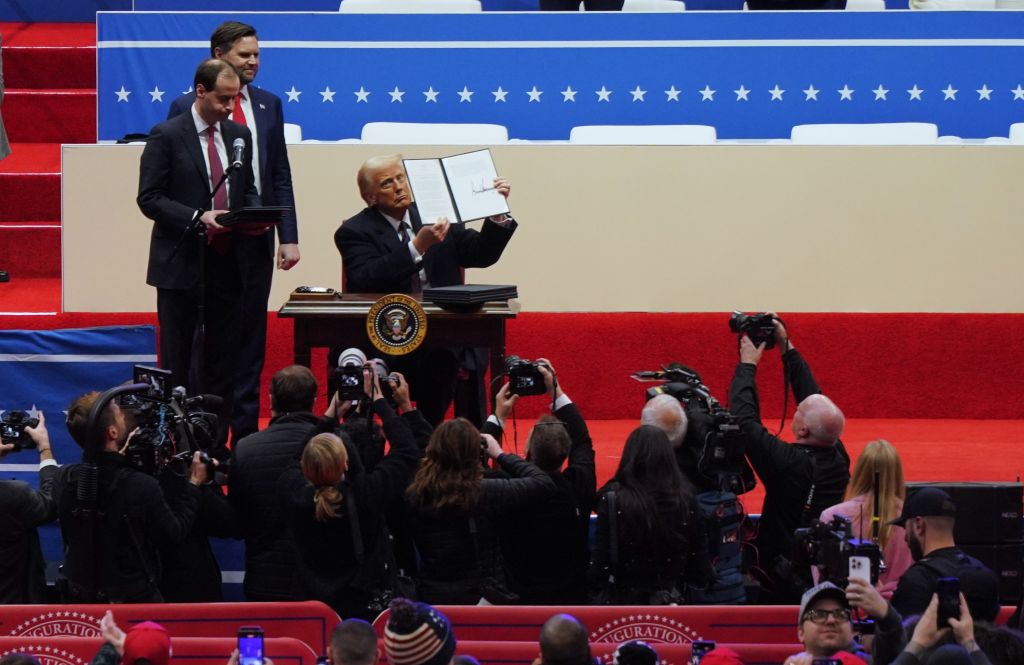

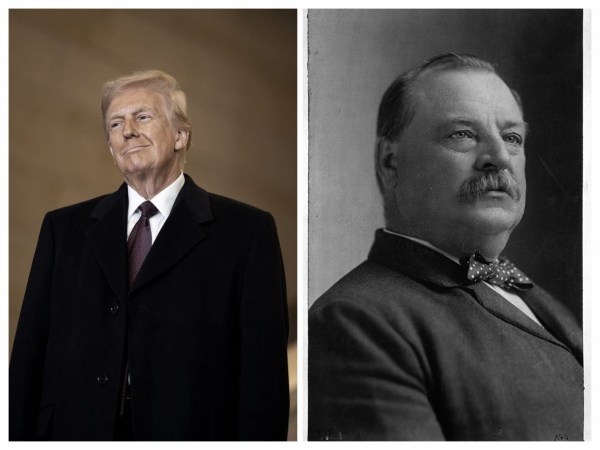
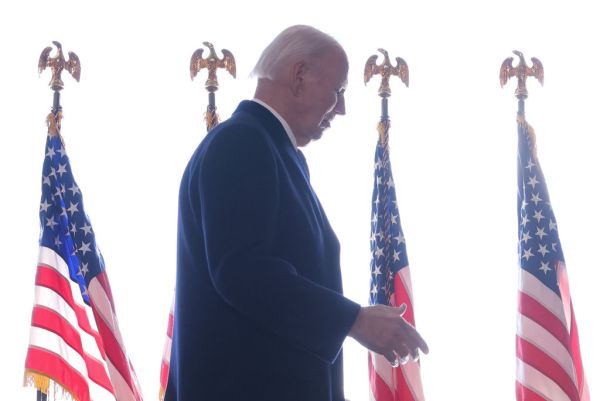
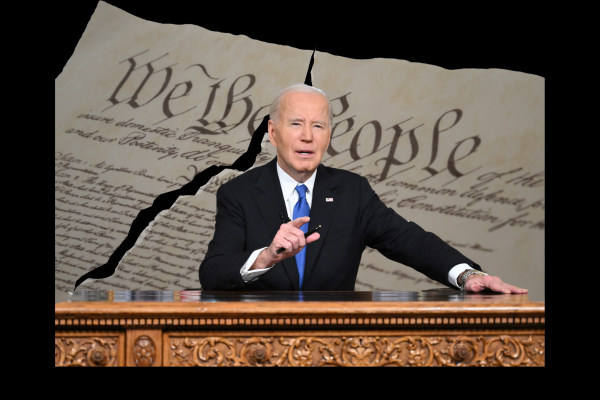
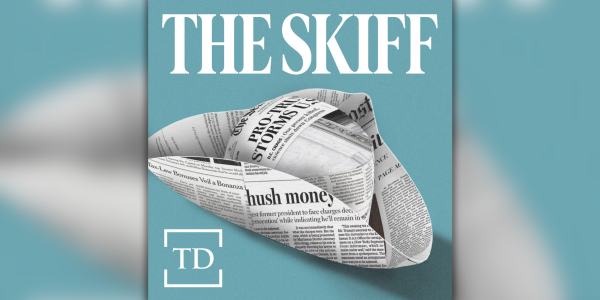
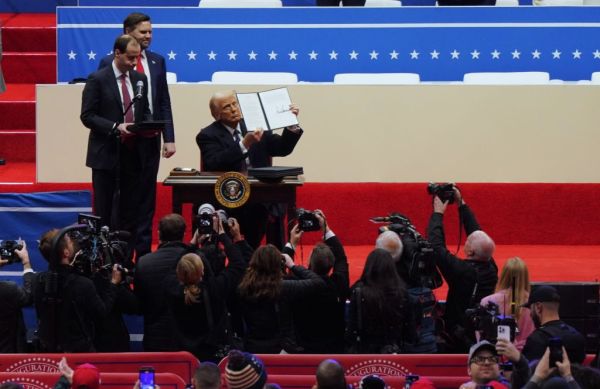
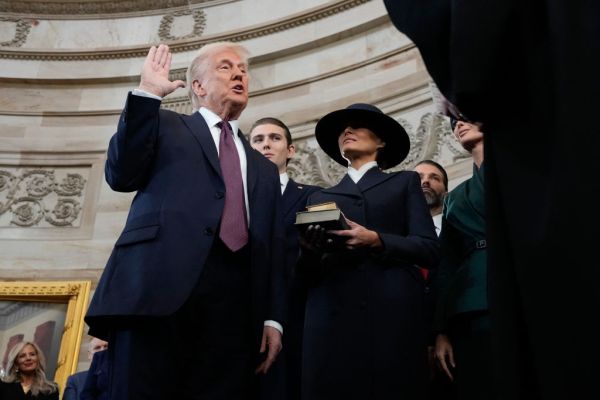


Please note that we at The Dispatch hold ourselves, our work, and our commenters to a higher standard than other places on the internet. We welcome comments that foster genuine debate or discussion—including comments critical of us or our work—but responses that include ad hominem attacks on fellow Dispatch members or are intended to stoke fear and anger may be moderated.
With your membership, you only have the ability to comment on The Morning Dispatch articles. Consider upgrading to join the conversation everywhere.